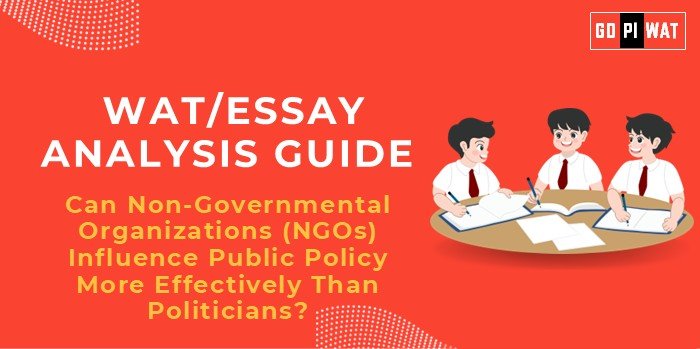📋 Written Ability Test (WAT)/Essay Analysis Guide
🤔 Can Non-Governmental Organizations Influence Public Policy More Effectively Than Politicians?
🌟 Understanding the Topic’s Importance
This essay examines the roles of NGOs and politicians in shaping public policy, focusing on their comparative advantages and limitations. The discussion is crucial for governance, ethics, and strategic leadership topics in B-school curricula.
⏳ Effective Planning and Writing
- Time Allocation:
- 🕔 Planning: 5 minutes.
- 🕒 Writing: 20 minutes.
- ✅ Review: 5 minutes.
- Preparation Tips:
- Research case studies highlighting NGO and political successes.
- Incorporate relevant statistics to reinforce arguments.
📝 Introduction Techniques for Essays
- Contrast Approach:
“While NGOs operate with agility and focus, politicians wield the legislative authority necessary to implement widespread change, raising questions about their relative effectiveness.”
- Case Study Approach:
“From Greenpeace’s environmental campaigns to Nelson Mandela’s anti-apartheid movement, public policy has been shaped by both NGOs and politicians in unique ways.”
📊 Structuring the Essay Body
Achievements:
- NGOs’ grassroots mobilization for social change.
- Politicians’ legislative authority enabling enforceable policies.
Challenges:
- NGOs’ lack of legislative power limits policy enforcement.
- Politicians’ susceptibility to political and electoral pressures affects impartiality.
Future Outlook:
- Advocate for collaborative governance models where NGOs and politicians co-create sustainable policies.
🤝 Concluding Effectively
- Balanced Perspective:
“NGOs and politicians play complementary roles; sustainable policy outcomes depend on their effective collaboration.”
- Global Comparison:
“From Africa to Europe, successful public policy often results from partnerships between NGOs and governments, underscoring the importance of synergy.”
🔧 Recommendations for Sustainable Progress
- Strengthen public-private partnerships for effective policy implementation.
- Establish frameworks to ensure NGO accountability and transparency.
✍️ Sample Short Essays
- Balanced Perspective:
“NGOs bring expertise and grassroots engagement, while politicians provide legislative authority. A collaborative approach ensures impactful and sustainable policy outcomes.”
- Solution-Oriented:
“To maximize public policy impact, governments should integrate NGOs’ grassroots insights into formal decision-making processes.”
- Global Comparison:
“Greenpeace’s success in environmental advocacy and the EU’s policy enactments demonstrate how NGOs and politicians together shape progressive policies.”


